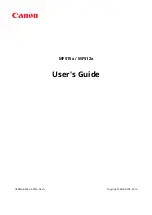
DC220/230ST Scanning Overview
DC220/230ST Scanning Overview
F
iling Protocol:
•
NCP is available for Ethernet and Token Ring filing
to a NetWare server.
•
FTP is available for Ethernet and requires an FTP
server running on a server or a workstation.
F
iling Policy:
An advantage of the
Overwrite
policy is that minimal
disk space is required since files are deleted and recre-
ated for each scan job. This makes it ideal for users with
their own file space.
A disadvantage of the
Overwrite
policy is that with a
central repository, users will overwrite each others files,
possibly before the file is retrieved.
An advantage of the
Append
policy is that no data is lost
because users share a central repository.
A disadvantage of the
Append
policy is that disk space
may easily be consumed if not managed properly. This
is especially true when each user has his or her own file
space.
An advantage of the
New Auto Generate
policy is that
no data can be lost-when a new file is generated, based
on the time and date of creation.
A disadvantage of the
New Auto Generate
policy is that
disk space may become an issue if not managed prop-
erly.
O
ptical Character Recognition (OCR)
If using the OCR capabilities of Visioneer PaperPort and
TextBridge
®
, it is recommended that you use an image
quality of “Text” and the highest resolution possible. This
will ensure the optimum OCR capabilities.
T
emplates
Use CentreWare
®
Internet Services to create additional
templates, so users do not need to manually modify the
default template for each scan job.
S
haring one Document Repository among-
multiple DC220/230s
More than one DC220/230 may use a Document Repos-
itory. Simply configure each DC220/230 in a similar
manner and create additional templates on each DC220/
230 as necessary.
C
entreWare Internet Services
CentreWare Internet Services is the built-in web server
on the DC220/230 that allows System Administrators
and users to configure scan settings by using a standard
web browser such as NetScape
®
(3.x >) or Microsoft
Internet Explorer
®
(4.x >). It enables you to:
•
Create new templates
•
Update existing templates
•
Modify scan configurations, including Repository
locations, enabling/disabling Confirmation sheets,
change Filing Protocols, etc.
Installation Considerations
THE DOCUMENT COMPANY
XEROX
THE DOCUMENT COMPANY
XEROX
Key Terms
D
ocument Repository:
Document Repositories are filing directories where TIFF files are stored. Typically, this will be
a NetWare server or FTP server.
T
emplates:
Templates control the features applied to the scanned document as well as the Filing Policy
and location. A default template (@default) is created during installation and stored on the
DC220/230. Additional templates can be created using CentreWare Internet Services, if avail-
able. A maximum of 250 templates that are approximately 4K each in size can be created.
T
emplate Pool:
The Template Pool is the central location on a server where templates created with Centre-
Ware Scan Services are stored.
F
iling Policy:
The Filing Policy specifies the method used to store the TIFF images in the Document Reposi-
tory. There are four options:
The
Overwrite
Filing Policy deletes any TIFF files stored in the Repository before sending the
newly scanned files for storage. All deleted files are lost.
The
Append
Filing Policy does not delete existing files. Newly scanned files are added to
existing files in the Repository. Deleting old files on a regular basis is recommended to
conserve server space.
The
New Exact
Filing Policy checks to see if any files exist in the Repository. If there are no
files, the newly scanned files are sent to the Repository. If there are files stored in the Reposi-
tory, the scan job is aborted. This Policy is available only with CentreWare Internet Services.
The
New Auto Generate
Filing Policy creates a new directory structure, based on the time and
date of creation, into which the TIFF images are filed. This is the safest Filing Policy, however,
it also requires a large amount of disk space. This Filing Policy is available only with Centre-
Ware Internet Services.




















